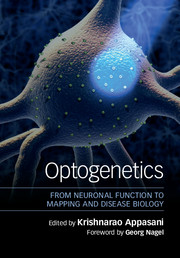Book contents
- OptogeneticsFrom Neuronal Function to Mapping and Disease Biology
- Optogenetics
- Copyright page
- Dedication
- Contents
- Contributors
- Foreword
- Preface
- Part I Optogenetics in Model Organisms
- Part II Opsin Biology, Tools, and Technology Platform
- Part III Optogenetics in Neurobiology, Brain Circuits, and Plasticity
- Part IV Optogenetics in Learning, Neuropsychiatric Diseases, and Behavior
- Part V Optogenetics in Vision Restoration and Memory
- Part VI Optogenetics in Sleep, Prosthetics, and Epigenetics of Neurodegenerative Diseases
- 28 Optogenetic Dissection of Sleep–Wake Control: Evidence for a Thalamic Control of Sleep Architecture
- 29 Optogenetics and Auditory Implants
- 30 Optogenetic Stimulation for Cochlear Prosthetics
- 31 The Role of Amino Acids in Neurodegenerative and Addictive Diseases
- 32 Optogenetics in Deep Brain Stimulation: Ethical Considerations
- Index
- Plate Section (PDF Only)
- References
32 - Optogenetics in Deep Brain Stimulation: Ethical Considerations
from Part VI - Optogenetics in Sleep, Prosthetics, and Epigenetics of Neurodegenerative Diseases
Published online by Cambridge University Press: 28 April 2017
- OptogeneticsFrom Neuronal Function to Mapping and Disease Biology
- Optogenetics
- Copyright page
- Dedication
- Contents
- Contributors
- Foreword
- Preface
- Part I Optogenetics in Model Organisms
- Part II Opsin Biology, Tools, and Technology Platform
- Part III Optogenetics in Neurobiology, Brain Circuits, and Plasticity
- Part IV Optogenetics in Learning, Neuropsychiatric Diseases, and Behavior
- Part V Optogenetics in Vision Restoration and Memory
- Part VI Optogenetics in Sleep, Prosthetics, and Epigenetics of Neurodegenerative Diseases
- 28 Optogenetic Dissection of Sleep–Wake Control: Evidence for a Thalamic Control of Sleep Architecture
- 29 Optogenetics and Auditory Implants
- 30 Optogenetic Stimulation for Cochlear Prosthetics
- 31 The Role of Amino Acids in Neurodegenerative and Addictive Diseases
- 32 Optogenetics in Deep Brain Stimulation: Ethical Considerations
- Index
- Plate Section (PDF Only)
- References
- Type
- Chapter
- Information
- OptogeneticsFrom Neuronal Function to Mapping and Disease Biology, pp. 463 - 469Publisher: Cambridge University PressPrint publication year: 2017

